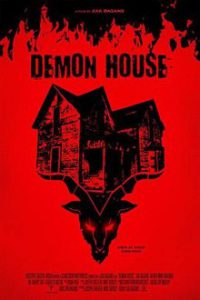“Demon House” – from Zak Bagans, host of TV’s “Ghost Adventures” — purports to chronicle a haunted house in Gary, Ind., but it ends up being a pseudo-documentary that makes me question the genre’s value. The film, which had a video-on-demand release earlier this year and is now streaming on Amazon Prime, delivers a decently scary vibe for a while, but I eventually became suspicious that this was a fictional movie rather than the documentary it claims to be, and was more likely to laugh than cower from that point forward.
Compelling backstory
The real-world backstory screams “This should be a movie.” Previous residents of the house in a poor neighborhood of the blue-collar city had behaved in irrational ways.
One committed suicide. Some reported hearing footsteps and growls. Some people who had merely been in the house – without residing there – moved out of town to get as far away as possible. Some people’s strange medical conditions stayed with them after departing the house.

“Demon House” (2018)
Director: Zak Bagans
Writer: Zak Bagans
Stars: Zak Bagans, Adam Ahlbrandt, Matthew Mourgides
Reports from media of borderline repute such as “Inside Edition” earned the house a reputation for being home to 200 demons. (Why not 100 demons? That seems plenty scary. It reminds me of the boy in “Seinfeld” who demands two home runs from Paul O’Neill.)
That’s enough for an honest documentary, and to be fair, Bagans does briefly note rational explanations for people’s behavior, including mold and gas leaks.
Would’ve made good horror flick
There’s also enough juicy material here to make a flat-out horror movie – even in the house itself. It’s old and small, but not in a cozy way.
The basement is suitably creepy, including one makeshift bedroom where a teenage boy killed himself. The floor is cemented over, except for the area under the stairs, which is dirt. Buried in the dirt are items that could’ve been used in a religious ritual, plus a press-on fingernail and women’s panties.
No matter how fake I believe “Demon House” to be, I wouldn’t desire to enter the house, and I’m not sure there’s an amount of money that would get me to stay in that basement overnight.
Unconvincing
The problem with “Demon House” is that it claims to be a documentary. While the stories of what happened to previous residents (or what they believe happened to them) are verifiable, the new events come off as a mix of reality TV, “re-enactments” (or just plain enactments) and fictional filmmaking reminiscent of the found-footage genre (“The Blair Witch Project,” “Paranormal Activity”).
My suspicions about the film’s legitimacy come from simple observations: the Gary police officer seems bit too much like an actor, cameras capture essential moments a bit too conveniently, and a lot of elements could have multiple explanations – although we are steered toward the supernatural one.

For instance, a former resident of the house – shown from a distance, with his face blurred out and his words unclear – wants nothing to do with the documentary. We’re led to believe it’s because he’s terrified, but it could be because he doesn’t want to be involved in the absurdity.
Further suspicions
An hour spent surfing the web after watching “Demon House” raises further suspicions. Yes, there are people in the film as “themselves,” but those credits include only Bagans, his camera crew and Barry Taff, a ghost hunter like Bagans.
The credits on the film itself list “re-enactors,” which accounts for major players such as a police officer and a priest (who we’re meant to believe are the genuine article when watching the film). But those actors aren’t listed on the IMDB page, which I’m guessing was part of the contract, as Bagans wanted to maintain an air of mystery.
Furthermore, Taff experiences “total organ failure” in the film’s narrative, and then talks about it from his hospital bed, looking pretty great for someone who underwent such an extreme health scare. Taff’s website bio does not mention this event – although granted, it hasn’t been updated since 2010.
But more notably, a Google search reveals nothing about Taff’s incredible medical journey outside of the film’s context. What happened to Taff – and it should be verifiable (or not) by the hospital – should be an incredible science story, period.
Bagans, meanwhile, says he has a permanent eye condition requiring prism-lens glasses as a result of the final act of “Demon House.” No online photos exist of him wearing these special glasses, nor is the condition listed in his web bios.
Could everything in the film be true? Technically, yes. Taff could’ve survived total organ failure and Bagans could have the eye condition. Every potentially supernatural thing about “Demon House” could indeed be supernatural. It’s in that space of reasonable doubt that “Demon House” aims to hook its audience.
But if it is all real, the film unfortunately has to be categorized as a failure, because it made be believe these real things are fake.

